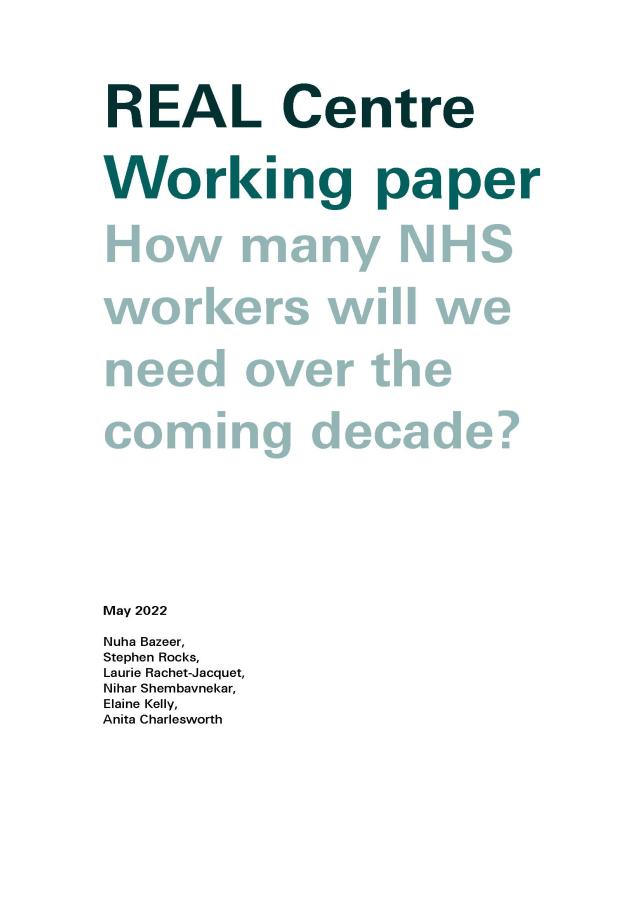How many NHS workers will we need over the coming decade?
May 2022

Key points
- In this working paper, we update our 2021 estimates of the number of full-time equivalent staff that the NHS in England might need to 2030/31, to account for potential improvements in productivity in acute trusts.
- Our central projection, in a scenario that assumes continued, but slower, reductions in the time spent in hospital, is that we would need around 314,000 more full-time equivalent NHS staff in 2030/31 relative to 2021/22 to deliver 2018/19 rates of care.
Workforce shortages are the biggest single challenge facing the NHS and adult social care. Effective workforce planning that considers the quantity and type of health care demanded by service users is key to addressing these shortages.
This working paper examines how many full-time equivalent staff the NHS in England might need by 2030/31 to meet projected demand under several alternative scenarios. The projected estimates are an update from our 2021 Health and Social Care projections report, and now account for potential improvements in productivity from reductions in average length of hospital stay and higher rates of day case procedures. They do not account for other variables that could influence productivity, such as changes in technology and workforce composition.
Recent decades have seen substantial changes in the amount of planned care that is provided on a day case basis in the NHS acute hospital sector, without the need for overnight hospital stays. Continuing improvements in the average length of stay and in day case rates could make a substantial difference to the number of additional staff that the NHS will need over the coming decade.
Our central projection, in a scenario that assumes relatively slow reductions in the time spent in hospital, is that around 314,000 more full-time equivalent NHS staff would be needed over and above existing vacancies in England in 2030/31 (relative to 2021/22), to deliver 2018/19 rates of care. This compares to a projection of 488,000 more full-time equivalent staff being needed in 2030/31, drawn from our October 2021 projections that did not account for potential productivity improvements.
OECD data suggest that the UK already has a lower length of stay and a higher day case rate compared to other OECD countries. Delivering lower average length of stay and higher day case rates without affecting quality and safety will be challenging and will rely on having effective integrated care, rather than simply a focus on hospital processes and flows. Further reductions in the average length of hospital stay are also likely to require additional capacity in general practice, community care and adult social care.
These projections highlight the scale of the NHS workforce growth challenge over the coming decade. Even if productivity improves and length of stay falls, the demand for additional staff will remain substantial. Future governments will face tough choices about NHS funding, how to deliver health services, and to whom.
Alongside these projections of NHS workforce demand to 2030/31, the REAL Centre will provide updated NHS workforce supply projections in an upcoming report, including a ‘deep dive’ into the nursing and general practice workforces in England.
Cite this publication
Further reading
Work with us
We look for talented and passionate individuals as everyone at the Health Foundation has an important role to play.
View current vacanciesThe Q community
Q is an initiative connecting people with improvement expertise across the UK.
Find out more


